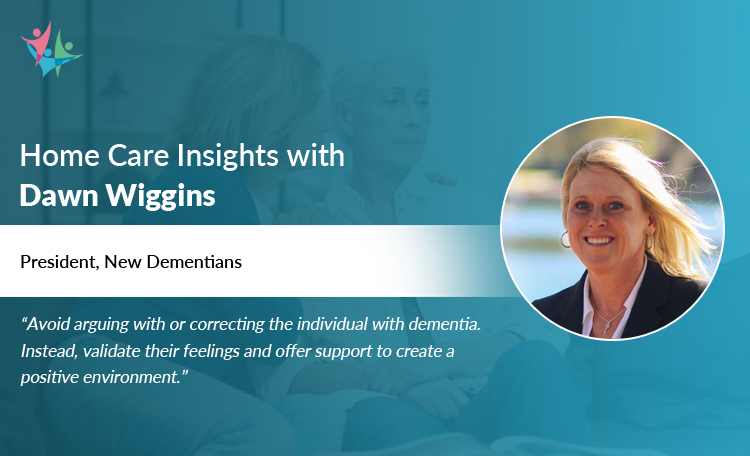When supporting an individual with dementia, it requires patience, understanding, and a focus on creating a safe and supportive environment. Set routines and maintain a consistent schedule to provide comfort and familiarity.
Communication must be clear, concise, and delivered calmly and gently. Focus on the person’s feelings and validate their emotions, even if their reality differs from yours.
When faced with challenging situations, try to assess which unmet need is triggering those behaviors. Then, try distraction or redirection with activities they enjoy. Most importantly, prioritize their safety by creating a dementia-enabling environment. Technology may be helpful if wandering and remaining safe is a concern. Also, always remember that you are not alone. Many resources are available to help you navigate this journey, including support groups and other professional caregivers.
To shed some light on the same, we interviewed a home care industry expert to bring her perspective on caring for individuals with dementia.

Who Did We Interview?
For over a decade, Dawn has been running the show as the president of New Dementians, a full-service consulting agency providing best-in-class advice and direction to businesses and individuals involved in or living with dementia. She also helps families of people with dementia navigate their own and their loved one’s journey with knowledge and care.
Let’s now delve into what she has to say about supporting individuals with dementia:
Care partners can effectively support individuals with dementia by involving them in decision-making and fostering autonomy and dignity. Further, implementing a structured routine, engaging in cognitive-stimulating activities, ensuring a safe home environment, providing emotional support, and maintaining open communication with healthcare professionals are crucial.
Emphasizing healthy habits and routines supports procedural memory, which remains healthy in dementia. It can be achieved through visual mapping with assistive technology, encouraging independence, improving quality of life, and reducing caregiver burden, making it a valuable asset in dementia care.
Yes, individuals with dementia can benefit from certain lifestyle changes to minimize the condition’s impact. Maintaining a healthy diet, staying physically active, engaging in cognitive activities, managing stress, getting enough sleep, and staying socially connected are all important to manage dementia symptoms and promote overall well-being.
Further, creating a safe and supportive environment at home can also help minimize the impact of dementia.
Family members and care partners should communicate calmly, clearly, and respectfully with individuals with dementia. Using simple language, speaking slowly, and maintaining eye contact ensure effective communication.
Besides, be patient, listen attentively, and provide reassurance. Avoid arguing with or correcting the person. Instead, validate their feelings and offer support to create a positive environment.
Care partners and family members can create a dementia-friendly environment by considering color contrast to aid visibility and recognition and placing labels and signage at eye level — around 4 feet from the ground — to make them easily accessible.
Declutter living spaces and organize belongings to reduce confusion and enhance safety while utilizing technologies like smart assistants — for example, Alexa — for medication reminders to manage daily routines.
Care partners must make the individual’s house dementia-enabling to prevent hazards and ensure safety. It includes removing tripping hazards like loose rugs or clutter, installing handrails in bathrooms and staircases, maintaining good lighting across the house, securing sharp objects and toxic substances, and using locks or alarms on doors and windows to prevent wandering.
Also, labeling drawers and cabinets, simplifying the house layout, and using memory aids like calendars and reminder notes can promote independence and reduce confusion for individuals with dementia.
Prioritize self-care and seek support from other family members or support groups. Establish a routine and, at the same time, be patient, flexible, and empathetic to individuals with dementia. After all, dementia symptoms can be unpredictable and challenging to support.
Seek professional assistance and knowledge about dementia. It helps provide the best possible support to the caregiver and the individual with dementia.
While supporting an individual with dementia can be demanding, there are effective strategies to make the journey smoother. Setting routines, clear communication, and validating the person’s feelings go a long way in managing the symptoms of dementia.
Further, creating a safe and supportive home environment is key, achieved through dementia-proofing and fostering a sense of calm. Last but not least, use resources like support groups and professional caregivers for guidance and support.
Our users reported 95% customer satisfaction in 2024. Schedule a personal walkthrough to see CareSmartz360, home care software in action.